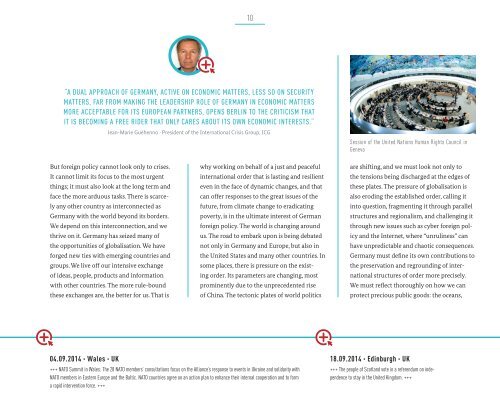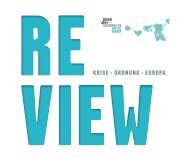Review 2014 – A Fresh Look at German Foreign Policy
“Crisis, Order, Europe” – these keywords highlight the main challenges for German Foreign Policy in the medium term. The project “Review 2014 – A Fresh Look at German Foreign Policy”, initiated by Foreign Minister Frank-Walter Steinmeier, has open up a broad public debate about the aims, interests and perspectives of German foreign policy. This report details the discussions of the past year, the expectations with regard to Germany’s global role raised within Germany and abroad as well as the foreign policy challenges in the future.
“Crisis, Order, Europe” – these keywords highlight the main challenges for German Foreign Policy in the medium term. The project “Review 2014 – A Fresh Look at German Foreign Policy”, initiated by Foreign Minister Frank-Walter Steinmeier, has open up a broad public debate about the aims, interests and perspectives of German foreign policy. This report details the discussions of the past year, the expectations with regard to Germany’s global role raised within Germany and abroad as well as the foreign policy challenges in the future.
You also want an ePaper? Increase the reach of your titles
YUMPU automatically turns print PDFs into web optimized ePapers that Google loves.
10<br />
“A DUAL APPROACH OF GERMANY, ACTIVE ON ECONOMIC MATTERS, LESS SO ON SECURITY<br />
MATTERS, FAR FROM MAKING THE LEADERSHIP ROLE OF GERMANY IN ECONOMIC MATTERS<br />
MORE ACCEPTABLE FOR ITS EUROPEAN PARTNERS, OPENS BERLIN TO THE CRITICISM THAT<br />
IT IS BECOMING A FREE RIDER THAT ONLY CARES ABOUT ITS OWN ECONOMIC INTERESTS.“<br />
Jean-Marie Guéhenno · President of the Intern<strong>at</strong>ional Crisis Group, ICG<br />
Session of the United N<strong>at</strong>ions Human Rights Council in<br />
Geneva<br />
But foreign policy cannot look only to crises.<br />
It cannot limit its focus to the most urgent<br />
things; it must also look <strong>at</strong> the long term and<br />
face the more arduous tasks. There is scarcely<br />
any other country as interconnected as<br />
<strong>German</strong>y with the world beyond its borders.<br />
We depend on this interconnection, and we<br />
thrive on it. <strong>German</strong>y has seized many of<br />
the opportunities of globalis<strong>at</strong>ion. We have<br />
forged new ties with emerging countries and<br />
groups. We live off our intensive exchange<br />
of ideas, people, products and inform<strong>at</strong>ion<br />
with other countries. The more rule-bound<br />
these exchanges are, the better for us. Th<strong>at</strong> is<br />
why working on behalf of a just and peaceful<br />
intern<strong>at</strong>ional order th<strong>at</strong> is lasting and resilient<br />
even in the face of dynamic changes, and th<strong>at</strong><br />
can offer responses to the gre<strong>at</strong> issues of the<br />
future, from clim<strong>at</strong>e change to eradic<strong>at</strong>ing<br />
poverty, is in the ultim<strong>at</strong>e interest of <strong>German</strong><br />
foreign policy. The world is changing around<br />
us. The road to embark upon is being deb<strong>at</strong>ed<br />
not only in <strong>German</strong>y and Europe, but also in<br />
the United St<strong>at</strong>es and many other countries. In<br />
some places, there is pressure on the existing<br />
order. Its parameters are changing, most<br />
prominently due to the unprecedented rise<br />
of China. The tectonic pl<strong>at</strong>es of world politics<br />
are shifting, and we must look not only to<br />
the tensions being discharged <strong>at</strong> the edges of<br />
these pl<strong>at</strong>es. The pressure of globalis<strong>at</strong>ion is<br />
also eroding the established order, calling it<br />
into question, fragmenting it through parallel<br />
structures and regionalism, and challenging it<br />
through new issues such as cyber foreign policy<br />
and the Internet, where “unruliness” can<br />
have unpredictable and chaotic consequences.<br />
<strong>German</strong>y must define its own contributions to<br />
the preserv<strong>at</strong>ion and regrounding of intern<strong>at</strong>ional<br />
structures of order more precisely.<br />
We must reflect thoroughly on how we can<br />
protect precious public goods: the oceans,<br />
04.09.<strong>2014</strong> · Wales · UK<br />
+++ NATO Summit in Wales: The 28 NATO members’ consult<strong>at</strong>ions focus on the Alliance’s response to events in Ukraine and solidarity with<br />
NATO members in Eastern Europe and the Baltic. NATO countries agree on an action plan to enhance their internal cooper<strong>at</strong>ion and to form<br />
a rapid intervention force. +++<br />
18.09.<strong>2014</strong> · Edinburgh · UK<br />
+++ The people of Scotland vote in a referendum on independence<br />
to stay in the United Kingdom. +++



